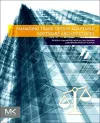
Managing Trade-offs in Adaptable Software Architectures
5 contributors - Paperback
£83.00
Ivan Mistrik is a computer scientist who is interested in system and software engineering (SE/SWE) and in system and software architecture (SA/SWA), in particular: life cycle system/software engineering, requirements engineering, relating software requirements and architectures, knowledge management in software development, rationale-based software development, aligning enterprise/system/software architectures, and collaborative system/software engineering. He has more than forty years’ experience in the field of computer systems engineering as an information systems developer, R&D leader, SE/SA research analyst, educator in computer sciences, and ICT management consultant. In the past 40 years, he has been primarily working at various R&D institutions and has done consulting on a variety of large international projects sponsored by ESA, EU, NASA, NATO, and UN. He has also taught university-level computer sciences courses in software engineering, software architecture, distributed information systems, and human-computer interaction. He is the author or co-author of more than 80 articles and papers in international journals, conferences, books and workshops, most recently a chapter Capture of Software Requirements and Rationale through Collaborative Software Development, a paper Knowledge Management in the Global Software Engineering Environment, and a paper Architectural Knowledge Management in Global Software Development. He has written a number of editorials and prefaces, most recently for the book on Aligning Enterprise, System, and Software Architecture and the book on Agile Software Architecture. He has also written over 120 technical reports and presented over 70 scientific/technical talks. He has served in many program committees and panels of reputable international conferences and organized a number of scientific workshops, most recently two workshops on Knowledge Engineering in Global Software and Development at International Conference on Global Software Engineering 2009 and 2010 and IEEE International Workshop on the Future of Software Engineering for/in the Cloud (FoSEC) held in conjunction with IEEE Cloud 2011.He has been the guest-editor of IEE Proceedings Software: A special Issue on Relating Software Requirements and Architectures published by IEE in 2005 and the lead-editor of the book Rationale Management in Software Engineering published by Springer in 2006. He has been the co-author of the book Rationale-Based Software Engineering published by Springer in May 2008. He has been the lead-editor of the book Collaborative Software Engineering published by Springer in 2010, the book on Relating Software Requirements and Architectures published by Springer in 2011 and the lead-editor of the book on Aligning Enterprise, System, and Software Architectures published by IGI Global in 2012. He was the lead-editor of the Expert Systems Special Issue on Knowledge Engineering in Global Software Development and the co-editor of the JSS Special Issue on the Future of Software Engineering for/in the Cloud, both published in 2013. He was the co-editor for the book on Agile Software Architecture published in 2013. Currently, he is the lead-editor for the book on Economics-driven Software Architecture to be published in 2014. Richard M Soley is Chairman and Chief Executive Officer of OMG ®. As Chairman and CEO of OMG, Dr. Soley is responsible for the vision and direction of the world's largest consortium of its type. Dr. Soley joined the nascent OMG as Technical Director in 1989, leading the development of OMG's world-leading standardization process and the original CORBA® specification. In 1996, he led the effort to move into vertical market standards (starting with healthcare, finance, telecommunications and manufacturing) and modeling, leading first to the Unified Modeling Language TM (UML®) and later the Model Driven Architecture® (MDA®). Nour Ali is a Senior Lecturer at the University of Brighton since December, 2012. She holds a PhD in Software Engineering from the Polytechnic University of Valencia-Spain for her work in Ambients in Aspect-Oriented Software Architecture. Her research area encompasses service oriented architecture, software architecture, model driven engineering and mobile systems. In 2014, the University of Brighton have awarded her a Rising Stars project in Service Oriented Architecture Recovery and Consistency. John Grundy is Professor of Software Engineering, Dean of Software and Electrical Engineering and Director of the Centre for Computing and Engineering Software Systems at the Swinburne University of Technology. Previously he was Professor of Software Engineering and Head of Department for Electrical and Computer Engineering at the University of Auckland, New Zealand. He is Assistant Editor in Chief of IEEE Transactions on Software Engineering, and Associate Editor for IEEE Software and Automated Software Engineering. He is on the Steering Committee of the IEEE/ACM International Conference on Automated Software Engineering. Bedir Tekinerdogan is a full professor and chair of the Information Technology group at Wageningen University in The Netherlands. He received his MSc degree (1994) and a PhD degree (2000) in Computer Science, both from the University of Twente, The Netherlands. From 2003 until 2008 he was a faculty member at University of Twente, after which he joined Bilkent University until 2015. He has more than 20 years of experience in software engineering research and education. His main research includes the engineering of smart software-intensive systems. In particular, he has focused on and is interested in software architecture design, software product line engineering, model-driven development, parallel computing, cloud computing and system of systems engineering. He has been active in dozens of national and international research and consultancy projects with various large software companies whereby he has worked as a principal researcher and leading software/system architect. He has developed and taught more than 15 different academic software engineering courses and has provided software engineering courses to more than 50 companies in The Netherlands, Germany and Turkey.